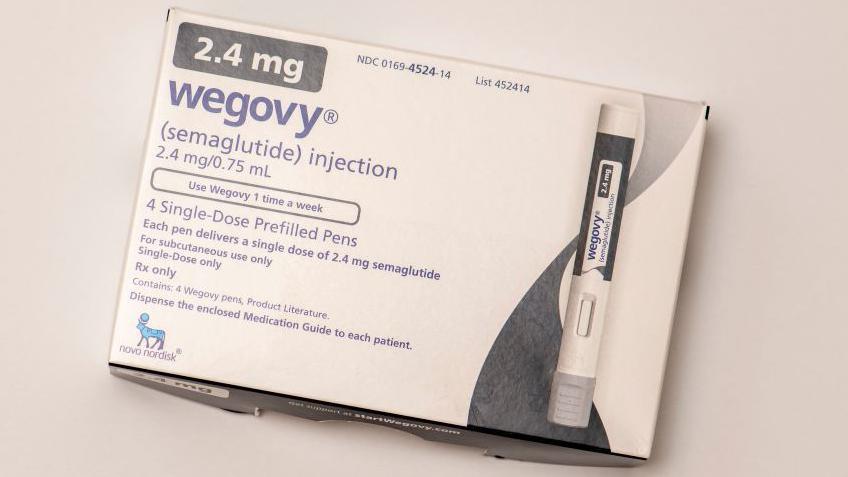Top doctor alarmed by weight-loss drug misuse

People are using the drugs to lose a few pounds to get ready for the beach this summer, Prof Powis said
- Published
NHS England's medical director says he is alarmed by reports that people are using weight-loss drugs as "a quick fix" to lose a few pounds and get "beach-body ready" this summer.
Professor Stephen Powis said the side-effects of the drugs could be dangerous, and they needed to be used under medical supervision.
Interest in Wegovy, for treating obesity, surged after studies suggested users could lose over 10% of their body weight.
Drug treatments are now seen as an important tool in tackling obesity.
Wegovy, a weight-loss injection, can be prescribed on the NHS in England to people at the top end of the obesity range through specialist weight management clinics. It contains the drug semaglutide, which makes people feel full and reduces their appetite.
Another anti-obesity drug called Mounjaro could be recommended for NHS use soon.
Semaglutide is also contained in the type 2 diabetes treatment Ozempic. It has not been approved for helping people who are obese to lose weight - yet there is huge demand for the medication, creating a shortage for diabetes patients.
Many online pharmacies are selling semaglutide injections for between £100 and £200, but they make few checks on the weight or underlying health of the person buying them.
A recent BBC investigation found an online black market in sales of semaglutide without prescription, which doctors said could put people's health at risk. The investigation also found the drug being offered in beauty salons in London and Manchester.
'People are misusing them'

Injecting a weight-loss drug into the stomach to reduce appetite
In a speech at the NHS Confederation conference on Thursday, Professor Stephen Powis, NHS England’s national medical director, said the drugs had clinical benefits, but he was alarmed to hear reports of them being "inappropriately used".
"These are powerful medications that have side-effects and complications - and can in certain circumstances, be dangerous," he said.
"So, they need to be used under medical supervision. They are absolutely not quick fixes for those who are otherwise healthy, who just want to lose a few pounds."
Prof Powis also said: "We know these new drugs will be a powerful part of our arsenal dealing with obesity – but they should not be abused.
“Drugs including Ozempic and Wegovy should only be used by people prescribed them for obesity or diabetes – I’m worried about reports that people are misusing them – they are not intended as a quick fix for people trying to get beach-body ready."
'Life-threatening'
The medications can cause side-effects such as nausea, bloating and vomiting, but for some people there can be more dangerous complications.
Dr Vicky Price, an acute physician and president-elect of the Society for Acute Medicine, said these included "serious, life-threatening complications, including inflammation of the pancreas gland and alterations in blood salt levels".
She and her colleagues are concerned about the growing numbers of patients they're seeing with complications from taking weight-loss drugs they have bought online.
The Royal College of GPs said it was "highly concerning" that patients were using semaglutide - under the brand name Ozempic - for purposes the drug is not licensed for, and without clinical supervision.
"It can be a genuine threat to patient safety - and potentially contributes to supply shortages, for those who could really benefit from them," said chair Professor Kamila Hawthorne.
"We would encourage patients to take caution when accessing medicine online, and only use outlets that follow GMC (General Medical Council) remote prescribing guidelines, and have been approved by the CQC (Care Quality Commission)."
Prof Hawthorne said it was never recommended to use prescription medication, without a prescription: "In many cases people might not actually be getting what they think they are, which is really dangerous."
